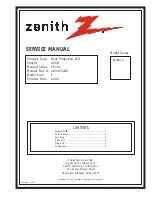
Section 2: Service Guidelines
CP2230 Service Manual
2-3
020-100562-06 Rev. 1 (05-2016)
2.3.3 AC/Power Precautions
Installation of this projector requires that an electrician hard-wire (permanent-wire) a single-phase feed from
the projector to the AC supply at the building site. Operate the projector at the specified voltage.
• DO NOT attempt operation if the AC supply is not within the specified voltage range.
• This product does not include a built in AC breaker. A 30-32A double pole, UL listed wall
circuit breaker is required. It must be part of the building installation and easily accessible.
• DO NOT use a wall breaker greater than 32A. This could result in severe damage to the
projector in the event of a failure.
• Protection from over-currents, short circuits and earth faults must be part of the building
installation. A disconnect device (double pole switch or circuit breaker with minimum 3 mm
contact gap) must be readily accessible within the projection room.
• Disconnect projector from AC before opening any enclosure.
• DO NOT allow anything to rest on the power cord. Locate the projector where the cord can-
not be abused by persons walking on it or objects rolling over it. Never operate the projec-
tor if the power cable appears damaged in any way.
• DO NOT overload power outlets and extension cords as this can result in fire or shock haz-
ards.
• Note that only Christie authorized service technicians are permitted to open any enclosure
on the product and only if the AC has been fully disconnected from the product.
2.3.4 Lamp Precautions
EXPLOSION HAZARD! Wear authorized protective safety gear whenever the lamp door
is open!
Any lamp used in the CP2230 is under high pressure and must be handled with great care at all times. Lamps
may explode if dropped or mishandled.
Wear Protective Clothing
Never open the lamp door unless you are wearing authorized protective clothing such as that included in a
Christie Protective Clothing Safety Kit #598900-095. Recommended protective clothing includes, but may not
be limited to a polycarbonate face shield, protective gloves, and a quilted ballistic nylon jacket or a welder’s
jacket.
NOTE:
Christie’s protective clothing recommendations are subject to change. Any local or federal
specifications take precedence over Christie recommendations.
















































